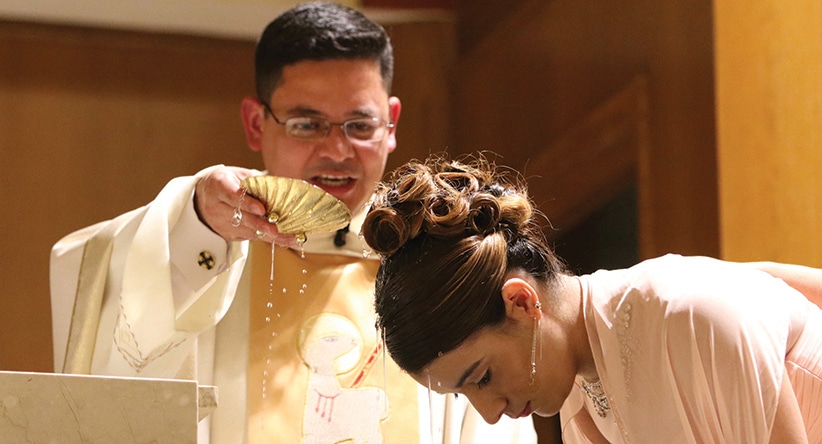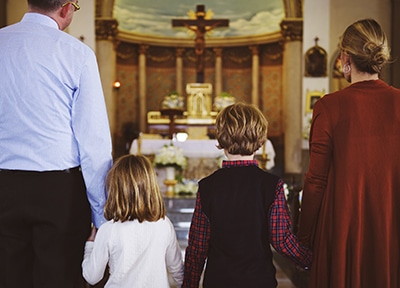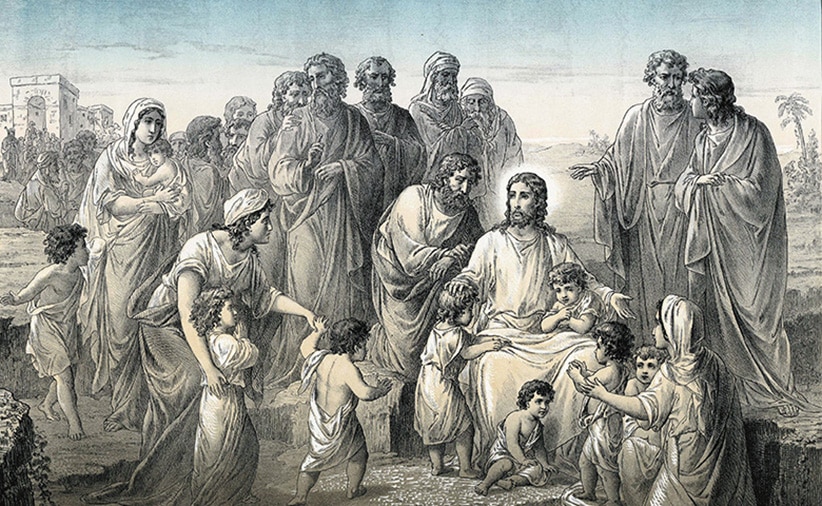This is the eighth in a 12-part series of In Focuses dedicated to exploring some central themes and texts in the Gospel of Matthew.
Not long after the Transfiguration, the disciples approach Jesus and ask, “Who is the greatest in the kingdom of heaven?” (Mt 18:1). The words suggest more than disinterested speculation. The disciples’ words are much the same as those we hear from the mother of James and John when she says to Jesus, “Command that these two sons of mine sit, one at your right and the other at your left, in your kingdom” (Mt 20:21). Jesus’ reply shows in both cases that those who ask “do not know what [they] are asking” (Mt 20:22). The glory they seek comes in ways unexpected. Those who would be greatest must “turn and become like children” (Mt 18:3). What, though, does this mean? What is it to become “like children”?
A desire for greatness
In our hearing, the desire to become great does not sit well. Surely the goal of becoming like children entails surrendering such adult-minded ambition. The love of Jesus is self-emptying and so, we might suppose, has nothing to do with seeking glory. The same, we reason, would be true of those who follow him. This is correct, but only half so. It is true that self-aggrandizement has no place in the kingdom. Those whose “works are performed to be seen” and who “love place of honor at banquets” (Mt 23:6, 5) come in for strong rebuke, and Jesus cautions us not to blow the trumpet “as the hypocrites do” when they seek “to win the praise of others” (Mt 6:2).
| QUESTIONS TO CONSIDER |
|---|
|
The praise that comes from God, though, is another matter. In the Sermon on the Mount, Jesus sets before us the goal of becoming the greatest in the kingdom. “[W]hoever breaks one of the least of these commandments and teaches others to do so,” he says, “will be called least in the kingdom of heaven. But whoever obeys and teaches these commandments will be called greatest in the kingdom of heaven” (Mt 5:19). The disciples, then, are not wrong in their desire for greatness. They are mistaken, though, in understanding what such greatness entails. Notice that Jesus does not say “forget greatness, and become like children instead.” Rather, he tells them, “Whoever humbles himself like this child is the greatest in the kingdom of heaven” (Mt 18:4). Again, though, what does this mean? What is it to become “like children”?
Humble obedience

In our passage, notice that the child does not begin at the side of Jesus. Matthew tells us that Jesus “called a child over, [and] placed it in their midst” (Mt 18:2). This is a significant detail. As St. Benedict says in the fifth chapter of his Rule, “The first degree of humility is prompt obedience.” The child in the story says nothing, but he or she is not entirely passive. They respond immediately to the command of Jesus. Fittingly for the point Jesus wishes to make, no mention is made of what the child itself had in mind to do. (My own children, like most, would much have preferred to stay put besides mom and dad.) The child is remembered only for the “prompt obedience” with which it moves to the side of Christ. It is, in other words, remembered for its humility, and it is this “eager obedience out of love,” as Father Erasmo Leiva-Merikakis describes it, that Jesus commends when he says to the disciples, “Whoever humbles himself like this child is the greatest in the kingdom of heaven” (Mt 18:4). Said otherwise: “To become a child has nothing to do with innocence or simplicity or sinlessness. Rather, Jesus is calling for humility, for what [St. John] Chrysostom called the ‘mother, root, nurse, foundation, and center of all other virtues,'” as W. D. Davies and D. C. Allison explain in their “International Critical Commentary” on Matthew.
Set in the wider context of Scripture, Jesus’ command that we “turn and become like children” reveals even more. The great gift of the Law was recognized in Israel as a form of wisdom. “See,” says Moses, “I am teaching you the statutes and ordinances as the Lord, my God, has commanded me, that you may observe them in the land you are entering to possess. Observe them carefully, for this is your wisdom and discernment in the sight of the peoples, who will hear of all these statutes and say, ‘This great nation is truly a wise and discerning people'” (Dt 4:5-6).
The reception of the Law at Sinai is accompanied by Israel’s desire for “prompt obedience.” When Moses set before them all the Lord commanded, “all the people answered together, ‘Everything the Lord has said, we will do'” (Ex 19:8). The one, therefore, who most embodies the virtue of humility, who acts with “eager obedience out of love” is the one who places the Law at the center of his existence: “Blessed is the man who does not walk in the counsel of the wicked, Nor stand in the way of sinners, nor sit in company with scoffers. Rather, the law of the Lord is his joy; and on his law he meditates day and night. He is like a tree planted near streams of water, that yields its fruit in season; Its leaves never wither; whatever he does prospers” (Ps 1:1-3).
A fresh start

It seems, then, that Jesus ought to have called out from the crowd one of the wise men of Israel, one who “meditates day and night” on what the Law commands. He does not. Instead, Jesus calls one whose only wisdom was an attentiveness to himself. And that is precisely the point, for “The beginning of wisdom is fear of the Lord, and knowledge of the Holy One is understanding” (Pr 9:10). Jesus is the embodiment of all the Law commands (cf. Mt 5:17), and it is attentiveness to him that allows one to possess a righteousness surpassing that of the scribes and Pharisees (cf. Mt 5:20). Indeed, the yoke of Christ is the fullness of wisdom, and so he can say, not with reference to Torah but with reference to himself, “Come to me, all you who labor and are burdened, and I will give you rest. Take my yoke upon you and learn from me, for I am meek and humble of heart; and you will find rest for yourselves. For my yoke is easy, and my burden light” (Mt 11:28-30). If God the Father has “hidden these things from the wise and the learned … [and] revealed them to the childlike” (Mt 11:25), it is because the latter, like the child whom Jesus calls to himself, respond with “eager obedience out of love.” It is a small wonder that Jesus refers to those who believe in him as “little ones” (cf. Mt 18:6, 10, 14).
“Our own suspicion,” write Davies and Allison, “is that when Jesus urged people to become as children he was, in effect, asking them to begin their religious lives afresh.” In the Talmud, a Jewish text from roughly the fifth century, “the convert to Judaism is ‘like a new-born child.’ The comparison is natural and occurs elsewhere, including Paul,” in places like 2 Cor 5:17. “The point,” according to Davies and Allison, “is that the sort of repentance Jesus demanded and its fruit, entrance into the kingdom, become no less significant than physical birth.” Such is the understanding in John’s Gospel, where we hear Jesus say that “unless one is born again” they cannot see the kingdom of God (Jn 3:3). Matthew speaks of the same and emphasizes the “courageous humility” that such rebirth requires. Just as “John the Baptist, by exhorting Jews to be baptized, may have been telling them that they had to think of themselves as though they were pagan converts, so Jesus, by calling his hearers to become like children, may have been encouraging them to see their lives as being in need of a new beginning.” Like the child who draws near the Lord’s command, the greatest in the kingdom is the one who can say “Speak, for your servant is listening” (1 Sm 3:10).

Entering Christ’s family
The image of the disciples as “little ones” suggests even more. The family was the site of religious instruction it was the duty of parents to instruct their children in commandments (cf. Dt 4:9, 6:7, Tob 1:7-8). Larry Yarborough notes that “in almost all the sources treating the obligations parents owe their children the emphasis is clearly on moral and religious education. Training a child in the way he should go meant teaching him the scriptures, the law, and the moral code which defined him as a Jew.” Analogizing his disciples to children suggests not only rebirth but so also entrance into the “family” of Jesus. This new allegiance superseded the “moral and religious education” proper to one’s family of origin: “Whoever loves father or mother more than me is not worthy of me, and whoever loves son or daughter more than me is not worthy of me” (Mt 10:37). As one of the “little ones,” the disciples would be defined above all by their likeness to Jesus. The life outlined in the Sermon on the Mount and enfleshed in the life of Jesus himself is handed to the disciples as the model of their own existence: “It is enough for the disciple that he become like his teacher, for the slave that he become like his master” (Mt 10:25).
| 3 KEY LESSONS |
|---|
|
When, therefore, Jesus instructs his disciples that they must “become like children” and humble themselves, he means more than that they should adopt the posture of a student. Jesus says of himself that he is “meek and humble of heart” (Mt 11:29). To become like a child means to become like the Son and to listen obediently to the will of the Father: “Not everyone who says to me, ‘Lord, Lord,’ will enter the kingdom of heaven, but only the one who does the will of my Father in heaven” (Mt 7:21).
Strange logic

This helps us to notice one last detail in Jesus’ answer to the disciples. The ending of his teaching is somewhat awkward. After telling the disciples that they themselves should “become like children,” Jesus speaks of them as those who, like himself, welcome children: “Whoever humbles himself like this child is the greatest in the kingdom of heaven. And whoever receives one child such as this in my name receives me” (Mt 18:4-5). They are both the ones welcomed and the ones who welcome. In the judgment of one commentary, “The narrative logic is a bit awkward. The child is no longer a model to be imitated but the object of one’s action.” How can we fit these two halves together?
According to the teaching of St. Thomas Aquinas, humility “regards chiefly the subjection of man to God, for whose sake he humbles himself by subjecting himself to others.” As Sheryl Overmyer, an associate professor of theology at DePaul University, explains, “We subject ourselves to God for God’s sake, we subject ourselves to our neighbors for God’s sake. In either act, Thomas is clear that we are revering God alone either directly or indirectly — Godself or God’s gift in others.”
To put this in terms of our passage, to be childlike before God is, in turn, to welcome “one child such as this” (Mt 18:5). The Son himself, in obedience to the Father, “did not come to be served but to serve” (Mt 20:28). And thus he says, “Let the children come to me” (Mt 19:14). So, too, the disciples are to “turn again and become like children” (Mt 18:3) and, thus, in turn, receive their fellow “little ones” with whom they are bound in love of Jesus. Thus it happens that in chapter 18, this teaching of Jesus moves next into a teaching on not causing the “little ones” to sin (18:6-9), seeking out the “little ones” who are lost (18:10-14), admonishing the brother who sins (18:15-20), and forgiving as we ourselves have been forgiven (18:21-35).
Becoming a child means beginning afresh in relationship with God. It means receiving anew and with “prompt obedience” the gift of God’s instruction — now no longer in the form of the Law but as it is revealed in the person of Jesus. Becoming like a child means becoming like the Son who in perfect obedience to the Father comes “not to be served but to serve” (Mt 20:28).
Anthony Pagliarini is an assistant teaching professor and director of undergraduate studies in the Department of Theology at the University of Notre Dame.
| COMING NEXT MONTH |
|---|
|
“The End of the World!” — One often hears the claim that the early Church, and even Jesus himself, expected the end of the world in short order. The “Olivet Discourse” in Matthew chapters 24 and 25 lends itself to such reading, but is it correct? Next month we will try and see what Jesus has to say about the passing away of all things.
|





